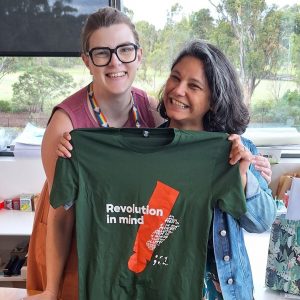Doctoral Researcher from the Millennium Nucleus Imhay internship in one of the world's leading suicide prevention research centers
Belén Vargas, a psychologist who is part of Imhay and a current doctoral student in Psychotherapy, traveled to the city of Melbourne to share her doctoral research and establish collaborative ties with members of Orygen, the National Center of Excellence in Youth Mental Health in Australia, a world-leading organization in research and knowledge transfer focused on youth mental health.

Belén Vargas, a doctoral researcher at Imhay, participated in an exchange program under the tutelage of Dr. Jo Robinson, a renowned mental health specialist and head of suicide prevention research at the Orygen Institute, University of Melbourne.
The young professional, who holds a master’s degree in Child and Adolescent Clinical Psychology and a doctoral student in Psychotherapy from the University of Chile and the Pontifical Catholic University of Chile, participated in an exchange program under the tutelage of Dr. Jo Robinson, a renowned mental health specialist and head of suicide prevention research at the Orygen Institute, part of the University of Melbourne. There, Belén Vargas gathered experiences to enrich her doctoral thesis on how to prevent suicide in educational communities and, specifically, the intervention that the Ministries of Health and Education in Chile are implementing in schools.
«I carried out this internship mainly to enrich my project, to learn about interventions that are currently being carried out in schools and also about research methods that, without a doubt, will nourish the entire basis for the application of my thesis,» explains the young Imhay scientist.
«They are already making progress in evaluating interventions in schools, but also in interventions in digital media and social networks. I was very interested in going to Australia to learn about how they do research together with young people. Everything they do today and all the research they do is done with the active participation of young people. That is something that is also important for Imhay.»
What caught your attention about the programs and the way they have in Australia to deal with these issues?
Although the main objective of my internship was to learn about new research methodologies and information to enrich my thesis, inevitably I was also interested in how they develop and implement public policies for these issues. To do this, I met with different academics and also with people in charge of programs in important organizations.
Something that I found very valuable about Australia is the amount of resources they have to address this issue, which is much greater than what we have in Chile at the state level. The investment they make in mental health is very high, and specifically for suicide prevention they invest a lot. They even have specific research funds for suicide prevention that finance large studies and are available each year to launch different projects.
Does Australia have high rates of suicide or is it rather that they have a special sensitivity to the issue?
Both. In general, in mental health they have a high concern for generating research and programs. For example, one part is what the State covers, but there is also a lot of philanthropy, people who make donations to make research centers work, as is the case with Orygen.
The other thing that caught my attention is the high level of collaborative work with civil society. It is something that I would like to see much more developed in Chile. And always with a sense of responsibility to implement safe and evidence-based initiatives for the community.
